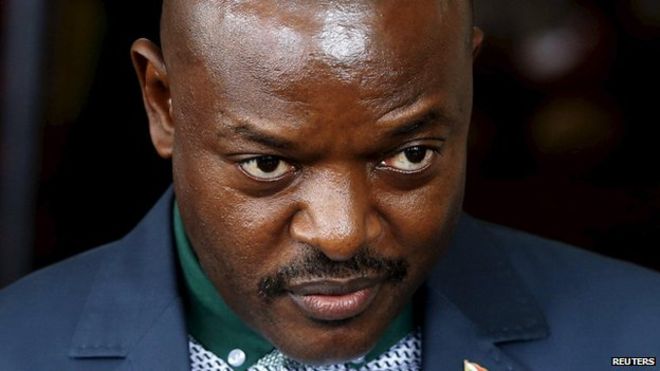President of Burundi Pierre Nkurunziza, on Monday reshuffled his cabinet following a coup attempt, sacking the Minister of Defence who had indirectly criticised his bid to seek a third term in office.
General Pontien Gaciyubwenge had encouraged the army to remain neutral during massive protests opposing Nkurunziza’s candidacy in the June 26 elections.
He also said the army supported the spirit of the Arusha Agreement, which ended a 12-year civil war in 2005 and said presidents must not serve more than two five-year terms.
Gaciyubwenge was replaced by Emmanuel Ntahomvukiye, a civilian, whom many see as Nkurunziza loyalist.
Laurent Kavakure, Foreign Minister was also replaced.
Irina Inantore was appointed successor to Commerce Minister Marie-Rose Nizigiyimana, who had been criticised over fuel shortages.
Observers said Kavakure may have been sacked for failing to convince the international community to support the elections.
They also noted that the sacking of the defence minister was expected to deepen the rift created in the army by last week’s coup attempt, which divided soldiers in pro- and anti-government camps.
Nkurunziza returned to Burundi on Friday, sparking protests the next day that were quickly dispersed.
In his first public appearance since the coup attempt, Nkurunziza warned that Burundi might be targeted by the Islamist group al-Shabaab because of national efforts to fight the militants.
He said the country contributed 5,400 troops to African Union peace mission to help the Somali Government to fight al-Shabaab.
Al-Shabaab in its response on Monday said the group had been falsely blamed by the Burundian president.
Ali-Mohamud Rage, al-Shabaab spokesman, said Nkurunziza was only trying to mislead his countrymen and women and the world’s attention, so that he can continue atrocities against his own people.
The United Nations noted that more than 105,000 Burundians have fled violence to neighbouring countries.







